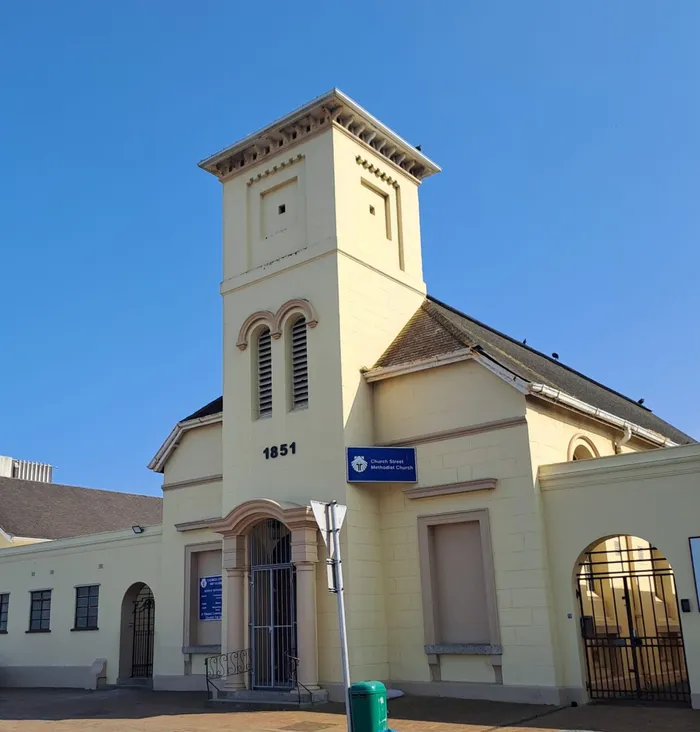Funds needed to run Wynberg homeless support centre

A fund-raising team is needed to help realise plans for a homeless support centre, run by U-turn, at the Church Street Methodist Church.
About R100 000 a month will be needed to run a centre for the homeless in Wynberg.
Preparations are under way to establish a U-turn Homeless Support Centre at the Church Street Methodist Church in Wynberg, says church minister, Reverend Graham Goodwin. While start-up capital is available to get the church ready to host the programme, they need a task team which would focus on raising funds for operational requirements, said Mr Goodwin.
“There is a need for both human resources as well as financial resources and so we would be looking for people to indicate if they are willing to volunteer time and participate when the programme unfolds.”
Over the course of the past year, he and Nancy Krisch, admin of the Wynberg CAN, have been in talks with the non-governmental organisation to work out the logistics of bringing a U-turn service centre on church grounds.
To get the ball rolling, an online meeting was held on Sunday September 21, where ward councillor Emile Langenhoven and Mr Goodwin discussed the need for a community-wide approach and the importance of raising funds to help establish the centre.
U-turn runs a multi-phased patient rehabilitation and skills development programme and through the proposed centre, people living on the street are able to access meals, clothing and ablutions with vouchers. These vouchers are sold to residents to give to the homeless instead of money so they are able to access these basic needs at the centre rather than spend money on other things.
“There are very few services being offered to those living on the streets in Wynberg that are recovery-focused as well as dealing with the homelessness aspect of people’s lives. We also have to deal with the addiction,” Mr Goodwin says. “U-turn is perhaps one of the most sustainable and long-term programmes that we have come across.”
Current plans are for the proposed centre to accommodate 60 programme participants at any given time. This excludes people who come to redeem vouchers.
Jon Hopkins, chief business development officer of U-turn, says nothing would be worse than opening a centre and having to close it a few months later due to a lack of funds. “This is not just bad for the people who have started a journey of change through U-turn, but also bad for the community as the centre will meaningfully engage close to 75 people each day keeping them off the streets and away from begging for their basic needs of food, clothing and shelter.”
Mr Hopkins said the monthly running costs of the centre would be about R100 000 - more than half of which would cover staff salaries. He outlined the breakdown as follows:
- About 55% would be used to pay staff including a centre manager, social worker, social auxiliary worker;
- 20% would be allocated to the rehab support programme – including transport and shelter for 10 individuals;
- 10% would go towards venue rental;
- 10% towards would be used for consumables and utilities; and
- 5% would be used for other costs, insurance, staff training, bank fees, small assets.
The centre will be open between 8.30am and 5pm Monday to Friday, Mr Hopkins said.
According to Ms Krisch, Wynberg east and west have dealt with lots of issues around homelessness and the knock-on effect of homelessness. “I believe that both Wynberg east and west are committed to working together to find a viable solution and a sustainable solution to this issue that will actually be a benefit to people and help them not only get on their way temporarily but hopefully to improve their lives immeasurably and in some cases be reunited with their families and truly to to break a cycle of addiction.”
Ward councillor Emile Langenhoven says Ward 62 is, for the most part, a ward of means and therefore a ward of possibilities, and that the impact of homelessness was felt even in more affluent communities.
“We have done the groundwork in creating the foundations of a solution, but we have come to the point where we must build on that foundation together to create the solution.
“If there are ideas of the City solving this problem, then those ideas must be erased. The City cannot ‘Safe Space’ its way out of homelessness. It is unsustainable and will have serious financial and other unforeseen impacts in the future.
“The ‘Safe Spaces’ are a means to an end in terms of the Prevention of Illegal Eviction from and Unlawful Occupation of Land Act (PIE Act) and eviction processes. They are not there to house the many thousands of homeless. They are there to ensure that the 1% who do accept assistance, are given access to housing as the constitution requires of the City,” Mr Langenhoven said.
Related Topics: